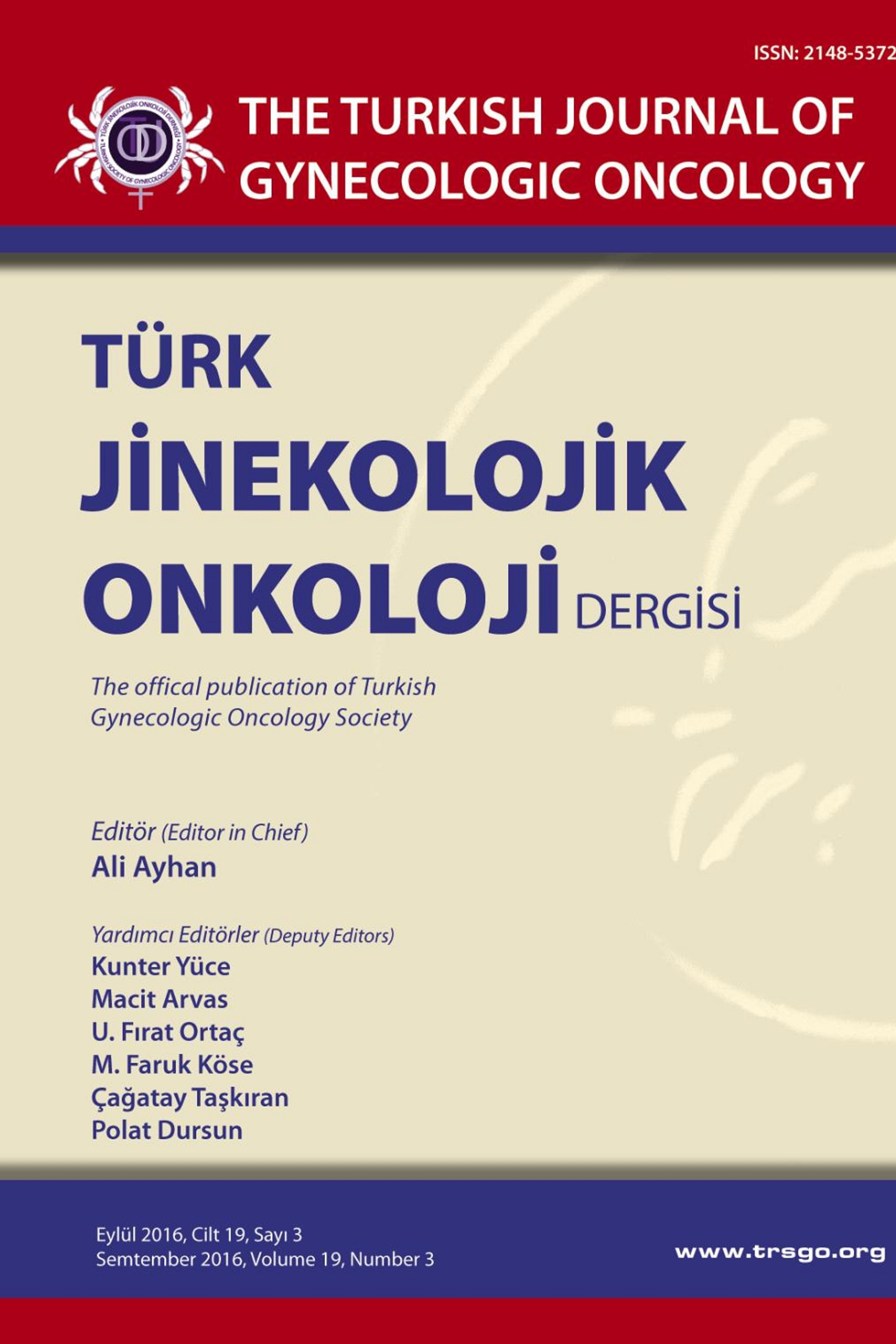RAT OVERİNDE OLUfiTURULAN ADNEKSİYAL TORSİYON MODELİNDE PERİOPERATİF SELENYUM VE C VİTAMİNİ UYGULAMASININ OVARYAN NEKROZ ÜZERİNE ETKİNLİĞİNİN DEĞERLENDİRİLMESİ
‹skemi, Reperfüzyon, Over, Selenyum, C Vitamini, ‹skemi/reperfüzyon Hasar›.
Ischemia, Reperfusion, Ovary, Selenium, Vit C, Ischemia/reperfusion Injury.,
___
- 1. Hibbard L. (1985) Adneksiyal torsion. Am. J. Obstet. Gynecol.1985; 152, 456-461.
- 2. Bayer A.I. and Wiskind, A.K. Adnexal torsion: can the adnexa be saved? Am. J. Obstet. Gynecol.1994; 171: 1506-1510.
- 3. Mashiach S, Bider D, Moran O, Goldenberg M, Ben-Rafael, Z. Adnexal torsion of hyperstimulated ovaries in pregnancies after gonadotropin therapy. Fertil Steril.1990; 53: 76-80.
- 4. Oelsner G, Bider D, Goldenberg M, Admon D and Mashiach, S. Long term follow-up of the twisted ischemic adnexa managed by detorsion. Fertil Steril. 1993; 60: 976-979.
- 5. Wagaman R and Williams R. S. Conservative therapy for adnexal torsion. A case report. J Reprod. Med. 1990; 35: 833-834.
- 6. McHutchinson L L, Koonings P P, Ballard C A. and d‘Ablaing G. Preservation of ovarian tissue in adnexal tissue with florescein. Am J. Obstet. Gynecol. 1993; 168: 1386-1388.
- 7. Sussman M S. and Bulkley G B. Oxygen-derived free radicals in reperfusion injury. Methods Enzymol. 1990; 186: 711-742.
- 8. Rangan U. And Bulkley G.B. Prospects for treatment for free radical-mediated tissue injury. Br. Med. Bull. 1993; 49: 700-718.
- 9. Das D.K. and Maulik N. Antioxidant effectiveness in ischemia-reperfusion tissue injury. Methods Enzymol. 1994; 233: 601-610.
- 10. Zimmerman B J and Granger D N. Mechanisms of reperfusion injury. Am. J. Med. Sci. 1994; 307: 284-292.
- 11. Yoshida S, Inoh S, Asano T, Sano K, Kubota M, Shimazaki H. And Ueta N. Effect of transient ischemia on free fatty acids and phospholipds in the gerbil brain. J. Neurosurg. 1980; 53: 323-331.
- 12. Jolly S.R, Kane W.J, Bailie M.B, Abrams G.D. and Lucchesi B.R. Canine myokardial reperfusion injury its reduction by the combined administration of superoxide dismutase and catalase. Circ. Res. 1984; 54: 227-285.
- 13. McCord, J.M. Oxygen-derived free radicalsin postischemic tissue injury. N. Eng. J. Med. 1985; 312: 159-163.
- 14. Fridovich I. Superoxide radical: an endogenous toxicant. Annu. Rev. Pharmacol. Toxicol. 1983; 23: 239-257.
- 15. Slater T F. Free radical mechanisms in tissue injury. Biochem. J. 1984; 222:1-15.
- 16. Gutteridge J.M.C. Lipid peroxsidasyon and antioxidants as biomarker of tissue damage. Clin. Chem. 1995; 41: 1819-1828.
- 17. Yoshida S, Abe K, Busto R, Watson B D, Kogure K, Ginsberg M D. Influence of transient ischemia on lipidsoluble antioxidants, free fatty acids and energy metabolites in rat brain. Brain Res. 1982; 245: 307-316.
- 18. Taflk›n Ö, Birincio¤lu M, Ayd›n A, Buhur A, Burak F, Y›lmaz and Wheeler, J.M. The effects of twisted ischaemic adnexa managed by detorsion on ovarian viability and histology: an ischaemi-reperfusion rodent model. Human Reprod. 1998; 13, 2823-27.
- 19. Nevin S, Üçler K and Alpaslan A. Ischaemia-reperfusion injury of rat ovary and the effects of vitamin C, mannitol and verapamil. Human Reproduction. 2002; 17(11): 2972-76.
- 20. Rodrigo R, Vinay J, Castillo R, Cereceda M, Asenio R, Zamorano J, Araya J, Castillo-Koch R, Espinosa J, Larrain E. Int J Cardiol. 2010; 138(3): 221-8.
- ISSN: 2148-5372
- Başlangıç: 2014
- Yayıncı: Türk Jinekolojik Onkoloji Derneği
POSTMENOPOZAL HASTADA MALİGN GÖRÜNÜMLÜ SERVİKAL ENDOMETRİOZİS: OLGU SUNUMU
Simender MESCİ HAFTACI, Dilek BATU DEMİR
Yetkin KARASU, Burak KARADAĞ, Berna DİLBAZ
ENDOMETRİUM KANSERİNDE RADYOTERAPİ- KEMOTERAPİNİN ROLÜ: RANDOMİZE ÇALIŞMALAR EŞLİĞİNDE DEĞERLENDİRME
Ali YAVUZCAN, Mete ÇAĞLAR, Yusuf ÜSTÜN, Serdar DİLBAZ, Seren TOPUZ, Sıtkı ÖZBİLGEÇ, İsmail ÖZDEMİR
LOKAL İNVAZİV VE KOMPLİKE SERVİKAL KARSİNOMLARDA PELVİK EKZANTRASYONUN ETKİNLİĞİ
Aliyeva GÜNAY AZER, Aliyev AZER RAFİQ
A RARE MASS OF THE VULVA: GIANT ENDOMETRIOMA
Burak KARADAĞ, Aşkı ELLİBEŞ KAYA
OVER TÜMÖRLERİNDE SERUM VEGF DÜZEYİNİN DİAGNOSTİK VE PROGNOSTİK DEĞERi
Mesut MISIROĞLU, Özlem ALTINKAYA, Ebru ZÜLFİKAROĞLU, Aylin SAĞLAM, Tayfun GÜNGÖR
Simender MESCİ HAFTACI, Mustafa ALBAYRAK, Şerif DEMİR, Ümran YILDIRIM, Handan ANKARALI, Fatih KESKİN
